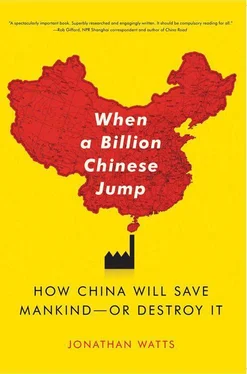“Isn’t the priority in the long term to reduce demand?” I asked.
He shrugged and smiled. “We cannot deny people a happy life.”
“But we also must not deny future generations a happy life,” I said.
“True,” he replied.
I returned to the Black Belt soon after. Driving through Shaanxi, the farther north I progressed, the duller the colors of the landscape became. After a few hours I hit the stunningly morose moonscape of the loess hills, pocked with cave dwellings, many still in use. That bleak beauty gave way to a scattering of dirty, cinder-block homes that lifted and thickened into the city of Yan’an. Farther north still, the dark yellow contours gave way to a flat scrubland. It was almost desert. I had to close the window because the air was filled with grit. I wondered whether the haze in the sky was pollution or the dregs of a sandstorm. At Yulin, where part of the Great Wall had been knocked down and replaced by a row of shops and apartment buildings, coal was piled up here and there on the roadside. The town looked filthy.
Moving on, I saw sand dunes and dry riverbeds. Coal production was taking scarce water supplies from agriculture. Dust devils danced on the road ahead, curling and coiling in the wind. At Shenmu, just before the provincial boundary with Inner Mongolia, I stopped at a service station, where trucks laden high with coal lined up for gas. It would be at least an hour before my car reached the front of the long queue for the pumps, so I wandered around and got chatting to a coal wholesaler. Zhang Guoluan was dour-faced but content with life. Why? Because his income had risen fivefold over the previous five years thanks to a surge in demand for coal. But he knew it would not last forever.
“I guess our country might stop using coal one day. It is already being phased out in the big cities because of the pollution it causes,” he said matter-of-factly.
I asked if he was worried about losing his job.
“No. If that happens, I will just return to my old life as a farmer.”
I filled my tank and pressed on. Zhang’s job was safe, I reflected. Demand for coal would not fall anytime soon. Power would always trump sustainability. Educated farmers no longer wanted to work underground because it was too dangerous, but both state mines and private collieries were hiring poor, uneducated workers, often from ethnic minorities, to do the dirty work, just as the West had done for centuries. Mine safety might improve but so would productivity. Local pollution might ease, but carbon emissions into the global atmosphere would continue to rise. For decades, hot, suffocating dregs of preancient life would enter the air in ever greater quantities.
China would remain trapped in carbon with appalling consequences for itself and the world. My thoughts returned to the Meng brothers, who seemed unlikely ever to fully recover from being buried alive. What had happened to them? I asked my assistant to call and ask. Meng Xianchen had moved to Xilinhaote in Inner Mongolia. He was a gatekeeper at a relative’s coal mine and still complained of fatigue. He escaped the carbon but not its effects. Nor had he lost his instinct for survival. “If you want a full interview,” he said, “you have to pay.”
I sympathized. But I would see and hear worse. As I was to learn in neighboring Gansu, coal digging was surpassed only by water mining as an environmental threat to China. Both were unsustainable. Together, there was no more destructive combination.
11. Attack the Clouds! Retreat from the Sands!
Gansu and Ningxia
No matter how hard mankind tries to transform nature, the largest plots of cultivated land are often overtaken by the elements: the wind and the sand which turns them into dunes, neither arable nor edible.
—Ma Jun, author and conservationist 1
Flying into Gansu was like landing on the moon. The plane descended through a rugged corridor of barren, gray-brown mounds that swelled up on either side and stretched away into the horizon. Bereft of trees and water, the corrugated landscape looked utterly desolate. Inside the hills, there was no sign of human activity. The earth seemed too dry to support life.
Overcultivation had left mountains naked. Mines, factories, and farms had drained streams and fouled rivers. Many wells no longer held water. Sand dunes threatened farm fields.
The same was true of much of the country. 2The droughts were getting worse. The shortage of water in northern China was the most pressing environmental problem facing the country and it prompted some of the most desperate remedies. Man had been fighting a battle against the desert here for centuries. Now, thanks to a squandering of resources, dire pollution, and climate change, humanity was in retreat on several fronts.
Guo Yuchun and Wei Guohu were the last to abandon their village at the foot of the Great Wall. They did not want to leave. Although the river that irrigated their crops had dried to a trickle and the dust storms were growing fiercer, they preferred their ancestral home to the new house provided under a government resettlement program. Living with scarcely any water was tough, but so were the old couple, who during their long lives had survived many deadly droughts and famines. But, in the end, even they joined the exodus, though not because of the elements.
“It got too lonely,” Wei told me with a broad smile that he seemed to save for his saddest comments.
Wei was eighty-four years old. He sported chunky, round dark glasses of a sort popular among old men in northwestern China and stroked a long, wispy beard that made him look like the guru in a kung fu movie. He was not used to visitors. They were few and far between in Jintai, a remote county on the provincial border between Gansu and Ningxia. This area is so dry that many villagers padlock their wells, even though they leave the doors to their homes open.
Wei and his wife had left their village the previous month. The couple’s new home had been hard to find. We had driven for three hours through some of the bleakest scenery in China to reach it. The area was almost devoid of human life. Over a 50-kilometer stretch I saw a single mining truck, an old brick kiln, three tethered asses, the dust of a nomad riding his horse up a distant mountain track, and, surreally, two workers in fluorescent orange jackets sweeping an empty road with straw brooms.
Even after reaching Wei’s village we struggled to follow the directions to his home. The hard brown land of gravel, loess, and sand lacked obvious features by which to navigate.
After going around in circles for a while, we reached a cluster of newly constructed brick dwellings with solar panels on the roofs. They were smart, but the residents clearly had more time and less money than the farmers I had seen in Henan. The stalks from the harvest were carefully bundled and stacked outside every home rather than burned in the fields.
Everything felt new and transient. Wei’s children and grandchildren showed us into a house that smelled of plastic and fresh paint. The furniture was still covered by the factory wrapping and the ceiling light was a fluorescent lamp rather than the naked bulb that was more usual in a farmer’s home. Even the wall portrait of Mao Zedong was shiny and plastic-coated. The colors were so garish that the dead chairman appeared to have transmuted into an Indian deity with lipstick and eye shadow.
The family were warm hosts, plying my assistant and me with fruit and tea as we waited to be properly introduced to the old couple. Wei seemed to find my assistant, with her city ways, almost as strange as a foreigner. When he shook her hand, he held on for almost a minute, scrutinizing her smooth fingers and palms so carefully that it was unclear whether he was trying to read her future or envying a past so evidently free of manual labor.
Читать дальше










